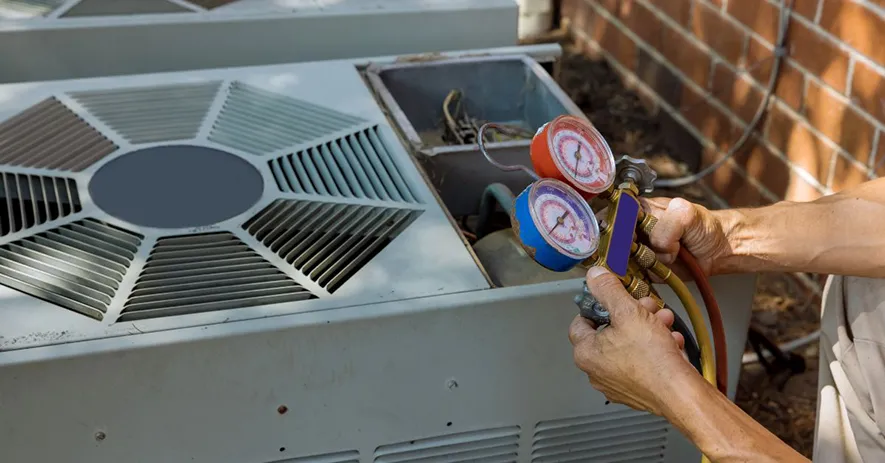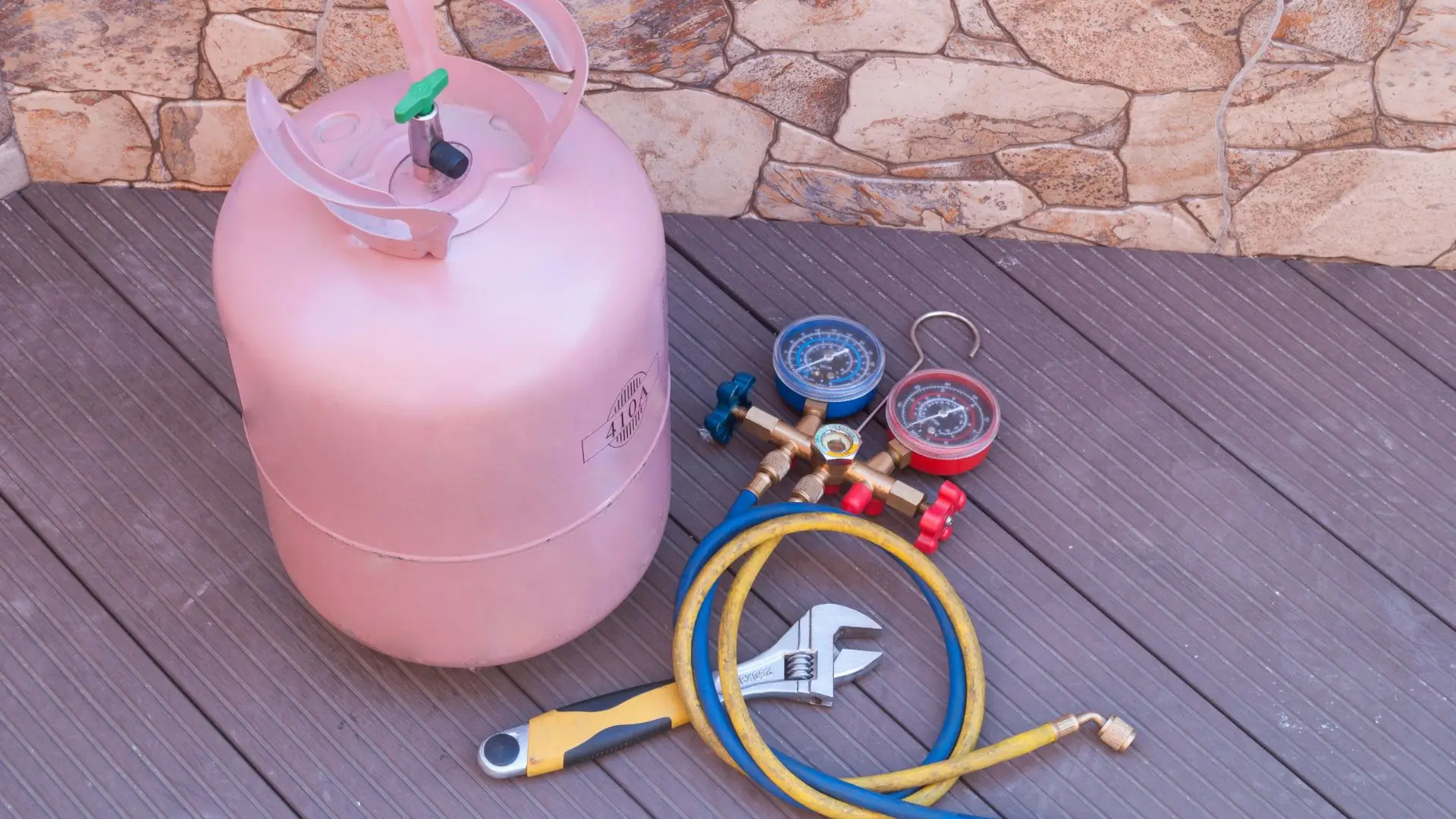Your air conditioner's refrigerant is what makes the whole cooling process possible. This vital compound is responsible for absorbing heat and humidity inside, and then expelling it back outdoors to create that refreshing chill you crave.
But when refrigerant levels run low due to leaks or other system faults, it's like pouring beverages with an empty pitcher - you're left hot and frustrated. Before your midsummer cooling relief turns into a muggy nightmare, watch for these 10 telltale signs that your AC unit is running short on its frozen fuel supply.
10 Signs Your AC Needs More Refrigerant
- Warm Air from Vents
- Hissing or Bubbling Noises
- Frozen Evaporator Coils
- High Energy Bills
- Longer Cooling Times
- Visible Leaks Around AC Unit
- AC Running Constantly
- Uneven Cooling
- AC Short Cycling
- Poor Performance in Humid Conditions

1. Warm Air from Vents
When you crank your thermostat to "Arctic Blast" but only get mediocre warmth trickling through those vents, it's one of the most obvious giveaways that your refrigerant levels are off. After all, this compound is key for absorbing excess heat and humidity inside your home before exhausting it back outdoors.
With a suboptimal refrigerant supply, your AC struggles to pull off this thermal transfer effectively. It's almost like squeezing the last few drops out of your beverage - there's just not enough cooling capacity left to produce those crisp air currents you're craving. Instead of a refreshing chill greeting you, you get an underwhelming puff of room-temp rejection.
While diminished airflow or a clogged air filter could also be partially to blame, persistently warm vents are often the first red flag that your refrigerant tank might be running lean. Don't just grit your teeth and power through another sweaty summer - get those frigid levels inspected and recharged ASAP!
2. Hissing or Bubbling Noises
With refrigerant being a condensed gas compound, inefficient supplies can frequently create telltale hissing or bubbling noises as it passes through your AC's coils and lines. These eerie whispering sounds are indicators that gaseous pockets are forming where there should be liquified refrigerant instead.
You know that gentle, consistent hum your trusty AC unit produces during normal operation? Well, any periodic hisses, glugs or percolating noises deviating from that steady baseline could spell refrigerant issues. It's sort of like listening to someone trying to sip the last dregs through a straw - that sucking, gurgling commotion is never a good sign.
Be sure to give your condenser and air handler units a periodic auditory inspection, carefully listening for any abnormal noises that could indicate low refrigerant charge. Those unsettling symphonies of hisses and bubbles are your AC crying out for a professional recharge before liquid levels fully vapor lock.
3. Frozen Evaporator Coils
When you're used to seeing sleek, well-designed AC components, spotting a thick rind of ice encasing your indoor evaporator coils is definitely an "Uh oh" moment. While it may look like a scene from Frozen, this Frosty situation is actually a major red flag that your refrigerant levels are off-kilter.
You see, properly charged refrigerant allows your AC to robustly transition between liquid and gaseous states for peak heat transfer. But when those levels dip too low, the reduced refrigerant flow can cause drastic temperature imbalances at the evaporator coil. This vital indoor component ends up getting overworked and freezes moisture from the air into an icy shell.
Beyond being an eyesore, this excessive ice buildup also chokes off airflow and puts strain on the entire system as it struggles against the frosty blockage. You might as well try blowing air through a glacier! If you don't address low refrigerant levels causing this issue, those rock-solid ice rivulets could eventually force an emergency system shutdown.
4. High Energy Bills
Preparing yourself for a pricier-than-expected electricity bill is never fun - except when it ultimately helps diagnose an underlying AC performance issue like low refrigerant. If you've noticed your monthly statements creeping up far beyond normal seasonal trends with no major adjustments to your cooling habits, it could be due to your system straining from depleted refrigerant stores.
Think of it like hosting a huge party but rapidly running out of drinks and ice to keep everyone refreshed. Your AC unit has to run for longer periods at maximum capacity trying to deliver the same cooling output with suboptimal refrigerant. And we all know how fast utility costs can spiral out of control when systems are constantly maxing out.
While abnormally high energy consumption obviously impacts your budget, it also puts extra strain and wear on your AC's components from the intense workload. Address those low refrigerant levels, and your system can return to peak efficiency before racking up surcharges or breakdowns.
5. Longer Cooling Times
On a scorching summer afternoon, there's no bigger buzzkill than firing up your AC only to wait...and wait...and wait some more for that refreshing cool air to finally circulate. If your system just seems lazier than normal at quickly chilling your home's air supply, don't just chalk it up to advanced age and inefficiency. Prolonged cooling times could be a red flag that your refrigerant tank is running low on vapor.
Like a bartender stretching those last few ounces of mixer, your air conditioner has to work extra hard to produce the same crisp, cooling output when refrigerant levels are suboptimal. Since this heat-transferring compound is responsible for absorbing warm air inside, depleted levels force your system to run longer just to reduce temperatures to that same comfortable notch.
Of course, leaving your AC on a deep cycle for extended stretches also leads to higher energy consumption and costlier utility bills. Calling in a pro to assess a possible refrigerant recharge could restore your system's snappy cooling capabilities.
6. Visible Leaks Around AC Unit
This one's about as direct and obvious as signs come: if you spot areas of moisture or fluid pooling around your AC system's indoor or outdoor units, it's an immediate "Check Engine" light that your refrigerant lines could be springing a leak. After all, this chemical compound does circulate between components as a liquid before reverting to a gaseous state.
Upon closer inspection, you may even see a thin stream of oily liquid or frost buildup tracing back to a specific spot - your Leak Ground Zero. Allowing any remaining refrigerant to keep draining, even slowly, will inevitably lead to a full system deprivation. At that point, your AC's cooling functions will be as productive as a lump of coal.
If you can't immediately locate the leak's source safely, don't try toughing it out yourself. Refrigerant leaks require an EPA-certified professional's assistance for proper detection and repair. Attempting a DIY patch could potentially risk exposure to hazardous compounds, so phone an expert at the first visible sign of a refrigerant escape.
7. AC Running Constantly
If your air conditioner never seems to take a break from running constantly, even when temperatures are relatively mild, it's often a surefire indicator that refrigerant levels are insufficient. Essentially, your system is stuck working overtime trying to overcompensate for the shortage of this vital cooling compound.
With an inadequate refrigerant supply, your AC struggles mightily to absorb surrounding heat and humidity at its typical pace. It's like asking a bodybuilder to lug around a modest shopping load - they have the muscle, but lack the proper equipment to work efficiently. So your system kicks into perpetual overdrive just to try closing that performance gap.
But pushing an AC unit to run for far longer stretches than designed puts tremendous stress on its components. You're essentially burning out that bodybuilder through sheer exhaustion. Excess wear from this constant overdrive can potentially lead to compressor failures, overheating issues, and other breakdowns if low refrigerant isn't addressed. Save your system from that perpetual marathon!
8. Uneven Cooling
Does it sometimes feel like your home's cooling is more akin to a polarizing drama - with some rooms blessed with artic chills while others are sweltering scorchers? Uneven cooling patterns throughout your floor plan could be your AC's way of waving a white flag about depleted refrigerant reserves.
You see, this compound is what allows your system to maintain consistent, balanced cooling across your entire air supply and ductwork. But when levels start running low, your AC's performance gets equally imbalanced as it struggles to displace heat evenly.
So you might notice weird hot spots near the ends of duct runs furthest from the cooled air source. Or whole zones of your home that just never seem to reach that crisp 72°F you're dialing up. These inconsistencies are your system essentially saying "I'm giving it all I've got...which ain't much left with this refrigerant situation!"
9. AC Short Cycling
If your air conditioner seems to be running in frustratingly short, intermittent cycles rather than chugging along steadily, it could be a hint that refrigerant levels are running low. This aggravating short cycling puts tremendous strain on your system.
You see, refrigerant is what allows your AC to absorb heat and humidity from inside your home over an extended period before redirecting it outdoors. But when levels get depleted, your system can't effectively pull in enough heat to keep that refrigerant cycling process going for optimal times.
So instead of nice, long cooling stretches, your AC kicks on briefly...then off...then on again just a short while later in a futile attempt to satisfy. It's like being stuck on a sweltering treadmill of discontent that's robbing you of any legitimate comfort. Short cycling also racks up higher energy costs while never truly cooling spaces properly. Stop that vicious cycle with a refrigerant recharge!
10. Poor Performance in Humid Conditions
Dry heat is one beast, but factor in humidity and things get exponentially muggier. If you've noticed your air conditioner just can't seem to keep up with dehumidifying your home's air supply during those classic summer scorchers, diminished refrigerant levels could be the culprit.
Refrigerant's primary job is transferring heat energy from inside your home to the outdoors. But this chemical compound also plays a vital role in removing excess moisture suspended in that humid indoor air. When levels get too low though, that dehumidifying capability plummets right alongside cooling capacity.
So instead of that crisp, dry chill keeping you comfortable, your AC starts feeling more like a subpar de-humidifier stuck recirculating muggy air no matter how low you crank the thermostat. Pay attention to any rooms struggling more than others with damp, clammy air flow - it could be your system sounding the alarm about refrigerant shortages before more failures arise.
Dealing with Low Refrigerant
If you're experiencing any of those telltale signs we covered, it's time to act quickly before low refrigerant levels escalate into even costlier AC repairs or full system replacements. Here are some recommended steps for properly handling refrigerant shortages:
Locate the Leak
The first order of business is identifying the precise source of any refrigerant leaks within your AC system. Tiny punctures, failed seals, corrosion and fatigue can all lead to refrigerant slowly escaping over time. An EPA-certified HVAC technician has the proper detection equipment and expertise to safely locate leak points without risk of exposure.
Stop the Leaks
Once the leak is found, your technician can seal off that escape point through repair techniques like soldering, replacing line segments, or installing moisture-proof covers over holes and cracks. Taking care of the leak issue first is crucial before attempting to recharge refrigerant levels back to their specified capacity.
Recharge Refrigerant
With a sealed AC system, your tech can then properly evacuate the refrigerant loop and recharge it with a fresh supply of refrigerant per manufacturer specifications. They have the right specialized tools and protective gear for safely working with these chemical compounds.
Test and Confirm Levels
After an initial recharge, the technician will monitor the system through a full cooling cycle to test refrigerant levels, make any final adjustments, and confirm the system is now operating within ideal parameters. Certified equipment ensures the proper refrigerant charge for your unit's size and cooling load.
Consider Upgrades
If your AC system is older and suffered a major refrigerant leak, it may be worth discussing potential upgrades with your HVAC pro rather than sinking more money into that aging equipment. Newer units are optimized for different refrigerant blends that are both more environmentally friendly and efficient at transferring energy.
Never attempt to recover, repair leaks, or recharge refrigerant levels yourself unless you have proper EPA certification. Refrigerant compounds can be hazardous to handle without training and safety equipment. Working on HVAC components also involves electrical and pressurization risks if you're inexperienced.
Additionally, allowing refrigerant leaks to persist unrepaired can steadily contaminate and degrade lubricants and other components within your system. This accelerates overall AC breakdowns and forces premature system replacements you could have avoided with timely, professional leak repairs and recharging service.
Be proactive about monitoring refrigerant levels and scheduling annual preventative maintenance checkups. Taking care of seemingly minor leaks saves you from needless long-term costs and downtime in the peak of summer's hottest stretches. Don't let low refrigerant keep you hot under the collar!
The Icy Cooldown You Crave Begins with Proper Refrigerant Levels
There's no bigger buzz-kill than an air conditioner that loses its frosty touch just when you need it most. From warm gusts of air disappointing your senses to soaring electric bills deflating your budget, running low on refrigerant is a surefire way to leave you high and dry in the cooling department.
While some refrigerant symptoms like frozen coils or hissing lines might be easy enough to detect, other performance dips could have you scratching your head in a muggy sweat. That's where the long-standing refrigeration experts at Sunset Heating & Cooling can lend a hand (and reliable AC recharge!)
For decades, this family-owned Portland operation has been the name locals trust for keeping refrigerant levels properly topped up and systems performing their best. Our certified HVAC techs know all the insider tips for quickly pinpointing leaks, repairing lines, and replenishing your unit with a fresh refrigerant refill to restore that full-blast cooling power.
So if your home's comfort-o-meter is straying more towards ‘hot mess’ than ‘chill oasis’ lately, don't stick it out sweating. Give Sunset Heating & Cooling a call at (503) 500-5866 or schedule an appointment online, and we’ll make sure your refrigerant reserves are ready to keep you and your family icy cold all summer long!







